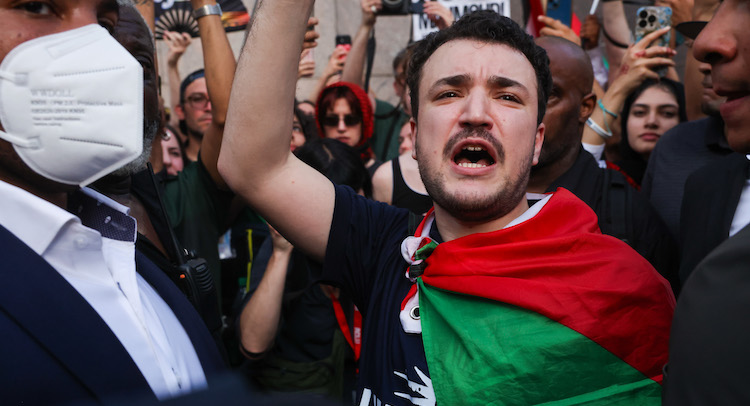When Mahmoud Khalil, the Syrian-born anti-Zionist protest figure at Columbia, was detained by ICE and threatened with deportation, his supporters portrayed him as a man of impeccable temperament without a hateful bone in his body.
So I was surprised to see that Khalil doesn’t present himself this way. In fact, in a wide-ranging conversation with Ezra Klein on the latter’s podcast, Khalil displayed casual cruelty toward American Jews, complete dehumanization of Israeli Jews, and an aggressive, parochial ignorance of the wider subject matter. I understand Khalil is angry with the Trump administration for detaining him, but Khalil made it perfectly clear that well before coming to Columbia he had shed any grain of empathy he might have once had.
Indeed, the interview leaves one wholly impressed not by Khalil but by the reputation-laundering public-relations campaign that preceded his big media tour.
Khalil first recounts his childhood in Damascus. His parents were middle-class civil servants, but he wanted to organize against the government and eventually fled to Lebanon to avoid reprisals. His grandmother used to live in Tiberias, and his parents raised him with the “sense that Palestine was taken from us, was stolen from us.” Stewing in the grievance toward the unseen Jew left Khalil in a familiar state of resentment. When Klein asked him about the anti-Zionist Jews he worked with while organizing against Israel at Columbia, he answered:
“Having lived in the Middle East most of my life, unfortunately, the only Jew you hear about is the one who’s trying to kill you. For those in Gaza and the West Bank — that’s the only Jewish person they encounter: the one at checkpoints, the one raiding their homes.”
In Syria, Khalil wasn’t around Jews because Syria had made its Jews second-class citizens and then violently drove them away in and around 1948. A more discerning young man raised on nakba ideology might have felt a bit of kinship with them, but Khalil does not appear to have been that young man. As for his contention that the only Jew one meets in Judea and Samaria is some kind of demonic, murderous phantom—well, that level of ingrained ignorance speaks for itself.
That meant, of course, that he liked Jewish Voice for Peace and other anti-Zionist Jews because they “felt that they can’t remain silent while a country is committing crimes in their names, who wanted to fight antisemitism by showing what real Judaism is.” I’m sure Khalil has lots of insight into “what real Judaism is.”
When Klein dared to suggest that “there was anti-Semitism at Columbia,” Khalil wouldn’t have it, leading to the following exchange:
Khalil: “I would push back regarding anti-Semitism at Columbia. I would really push back on that.”
Klein: “There was none?”
Khalil: “I wouldn’t say there was none. I would say there is this manufactured hysteria about anti-Semitism at Columbia because of the protests.”
That response is typical of the entire interview. Khalil cannot for one second imagine a perspective that isn’t his own. The very idea that there was anti-Semitism at Columbia makes him increasingly angry during the discussion. His extraordinary penchant for dishonesty leads him to make the following astonishing remark: “It’s not like anti-Semitism is happening at Columbia because of the Palestine movement.”
At this point, one begins to see Khalil’s self-absorption as pathological. The “Palestine movement” at Columbia, on behalf of Palestine, assaulted school employees, held them hostage, and painted swastikas on the walls while calling their captives “Jew-lovers,” in one of a long list of documented incidents.
Later, Khalil objects to those who are made uncomfortable by the pro-Hamas activists who chant explicitly genocidal phrases: “I think it’s based on policing Palestinian thought and speech. That’s what it’s based on. Because ‘From the river to the sea’ — from the Palestinian perspective — no one ever said that it’s a violent call.”
Even Klein was taken aback, yet again. The two talked about another such chant: “Globalize the Intifada.” Some people defend using this phrase by denying that it references the actual intifada and claiming instead that it was open to interpretation. But Khalil doesn’t shy away from it. Instead, Khalil agrees that the phrase references the Second intifada but asserts that the intifada “involved violent acts, but overwhelmingly, they were peaceful.”
The part of the interview that has received the most attention, of course, is when Khalil says of Oct. 7, “Unfortunately, we couldn’t avoid such a moment.” Klein and Khalil dig further into this thesis, and eventually have the following exchange:
Klein: “On some level, I understood [the ensuing war] as something Hamas must have wanted…. Was that your perception? Or did you see this as something that needed to happen to break the equilibrium?”
Khalil: “It’s more the latter — just to break the cycle, to break that Palestinians are not being heard. And to me, it’s a desperate attempt to tell the world that Palestinians are here, that Palestinians are part of the equation. That was my interpretation of why Hamas did the Oct. 7 attacks on Israel.”
It’s good for the public that Klein sees Khalil as such a sympathetic martyr figure, because the resulting softball interview lets Khalil paint his worldview however he wants to. And his worldview is tinged with violence and the dogmatic dehumanization of Jews. The only thing I can possibly credit Khalil with is the decision to not even try to hide it.


















